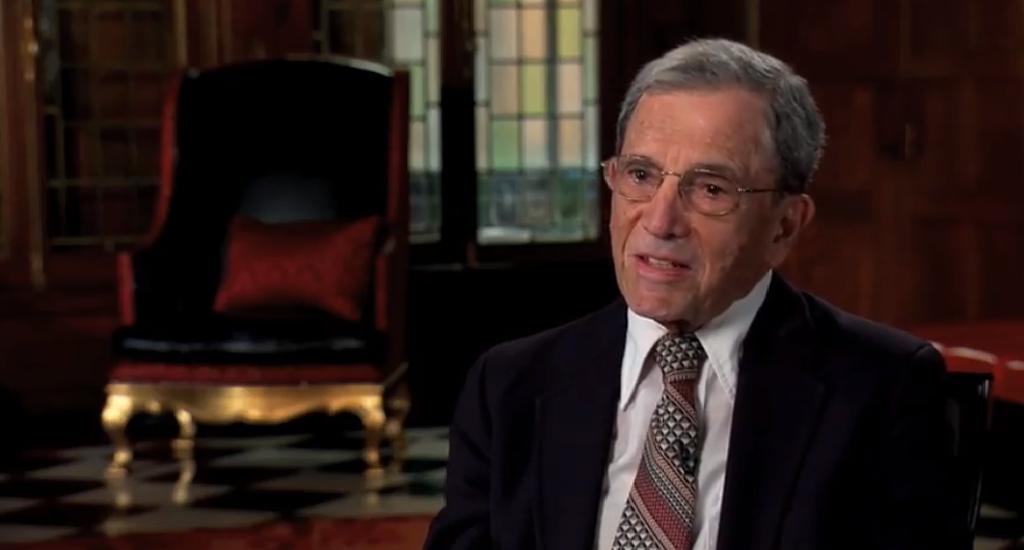Keeping Company with the Great Authors: A Conversation with Ralph Lerner
Ralph Lerner is one of our nation’s most distinguished political philosophers. The Benjamin Franklin Professor Emeritus in the College and the Committee on Social Thought at the University of Chicago has ranged widely in political philosophy, teaching and writing on medieval philosophy, Alexis de Tocqueville, 17th and 18th century British thinkers, and the American Founding, among other subjects. His work on medieval Muslim philosophy blazed a trail that other scholars have been following since the publication of his coedited Medieval Political Philosophy: A Sourcebook (with Mushin Mahdi, Cornell University Press, 1963). In 2001, the Liberty Fund reprinted the landmark work he edited with Philip B. Kurland, The Founders’ Constitution (five volumes, originally University of Chicago Press, 1987). His many books include Revolutions Revisited: Two Faces of the Politics of Enlightenment (University of North Carolina Press, 1994) and Playing the Fool: Subversive Laughter in Troubled Times (University of Chicago Press, 2009).
Lerner is known for the wit and elegance of his interpretive essays, the latest collection of which is Naïve Readings: Reveilles Political and Philosophic. Law and Liberty’s associate editor, Lauren Weiner, asked him about it; here is the Q and A.
Lauren Weiner: Let me start by asking why you advocate reading naively. Shouldn’t we aim to be sophisticated readers?
Ralph Lerner: Good question! As we are growing up, we are encouraged by our mentors to become more discerning, to put away childish things and naïve ways of thinking. In short, we come to regard puzzling over the obvious as somehow simple-minded. To be truly sophisticated is to begin by digging deep.
The trouble with this counsel is that it narrows our field of vision. I like Sherlock Holmes’ explanation to the ever-befuddled Dr. Watson: “You see, my dear Watson, but you do not observe.” Impatience as well as a predisposition to ignore the surface of things undercuts our ability to observe and, ultimately, our ability to understand.
LW: The book contains nine essays on eight authors, ranging from Ben Franklin to Moses Maimonides. Is there an overarching theme?
RL: I have kept company with these authors for many years, both in private study and public teaching. The essays in this book grew out of that association. Some of these works enchanted me, others kept me dissatisfied with my feeble grasp of what their authors were trying to convey. In all cases I found that in revisiting these texts again and again, I would get a clearer sense of the artfulness of the authors and a growing confidence that renewed attention to their mode of presentation would pay a reward. Obviously, not every author or text deserves such deference and attention. But patience and experience will teach us soon enough to detect the difference.
Yes, there is indeed an overarching theme, one that disclosed itself to me gradually and in retrospect. In their different ways, each of my authors is trying to combat fatalism, passivity, and the feeling that we are so enmeshed in a foreordained destiny that we can only sit, like Jonah, and wait for the worst to happen. Not so, these authors teach. There is not only room for human providence, but a need for it. We ordinary mortals should bring our intelligence and skills, however limited, to avert the worst and work toward the best. Theirs is a message of hope and commitment.
LW: You write about the fact that Franklin adopted many personae in his writings. Why would the man who’s considered America’s first self-improvement author never give his advice under his own name?
RL: From very early on, the young Benjamin Franklin chose to hide himself behind a mask. This was a deeply considered strategic decision, one to which he held throughout his long life. In the beginning, I would suppose, he was keenly aware of his relatively low status in early 18th century Boston, a town dominated by a Congregationalist hierarchy and political establishment. His youth, lack of formal education, and working-class background meant that public predispositions would not run in his favor. He had, in a sense, to reinvent himself—the self-made man—and earn a reputation as someone worth listening to.
In pondering how best to accomplish this, Franklin was impressed by the weakness, indeed the futility, of sermonizing as a mode of getting people to change their behavior and improve their ways. Rather than beating them over their heads with proofs of their sinfulness and inadequacy, he chose to seduce them into a state of mind that enabled them to see themselves with new awareness. His favorite device was literary, an essay or letter or speech by a fictive character, more or less looney, but filled with self-importance, and easy to laugh with and laugh at. Franklin’s fertile imagination never failed him. His grab bag of characters (including the youth and man depicted in his autobiography), made it possible for him to offer models and thoughts considerably at odds with the pious, parochial world of his elders.
LW: We at Law and Liberty would like to congratulate you, by the way, on your 90th birthday. What is next for you in terms of your writing?
RL: Thanks for your good wishes. It would be folly for me, at this age, to have great expectations about another writing project, let alone completing it. Yet there is another author I would wish to revisit—Edmund Burke—in the belief that there is more to be said.
Burke’s political life (did he have any other?) is marked by failures and disappointments. The prodigious efforts he made with respect to reforming or redirecting Britain’s policy toward the American colonies, the Irish Catholics, the French revolutionaries, the governance of India, religious toleration, and chattel slavery—all came to naught. His vindication (if it came at all) came many decades after his death. It took that long for public sense and sensibilities to catch up with his moral imagination. I detect a unity in his various campaigns, a unity driven by his deep revulsion at gratuitous cruelty. That is a theme I would like to explore if I could.



